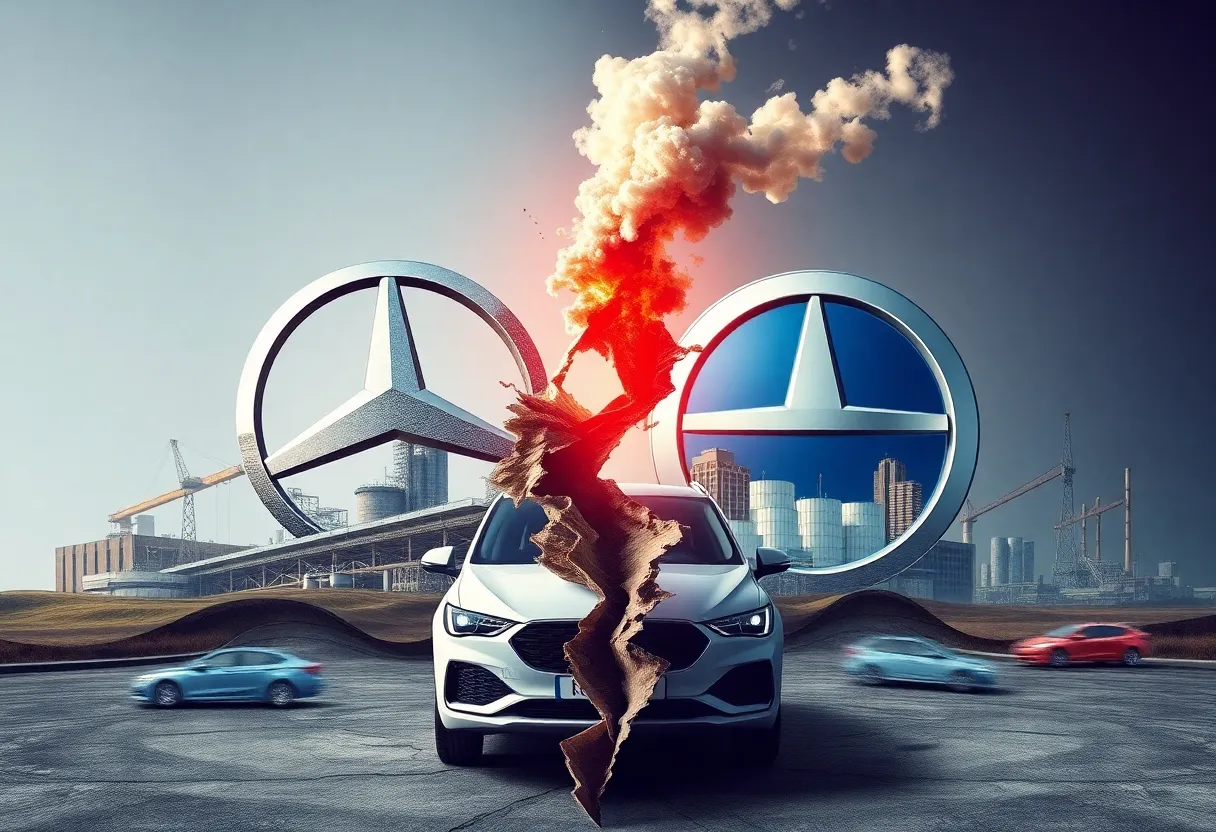

An artistic depiction of the challenges faced by Honda and Nissan in their halted merger discussions.
Honda Motor and Nissan Motor have officially halted their discussions on a $50 billion merger due to various industry challenges. These two automotive giants had initiated talks in December to combine resources amidst rapid technological changes and internal concerns. Nissan faces significant financial restructuring and layoffs, impacting its perceived stability. The halted merger reflects the complexities and uncertainties of the automotive landscape as companies navigate evolving market conditions and competition from electric vehicle manufacturers.
In a surprising twist, Honda Motor and Nissan Motor have officially put the brakes on their discussions for what would have been a monumental $50 billion merger. These two automotive giants had kicked off talks in December, hoping to pool their resources and tackle the challenges of the ever-evolving car industry. However, they slid into a decision to walk away from negotiations that was announced just recently.
This merger was touted to create one of the world’s largest auto groups, which would have given both companies a robust platform to compete in the fast-paced and tech-driven environment posed by rivals like Tesla and BYD. The plan was simple: share costs, innovate together, and ready themselves for the next generation of vehicles. But as it turns out, sometimes the best-laid plans just don’t pan out the way you hope.
The auto industry is currently riding a wave of rapid technological changes, which some experts have pointed out may not be best navigated by merging two large players. This shift is leading many traditional automakers to reconsider their alliances and what it means for their future. The struggles of Ford and Volkswagen with their joint efforts on electric and self-driving technologies serve as cautionary tales, reminding everyone that these partnerships can sometimes yield less-than-stellar outcomes.
As 2023 rolled around, Honda had already decided to limit their partnership with Nissan, selling a couple of electric SUVs that were produced by General Motors, simply choosing not to push forward with expanding their collaboration. Additionally, Honda’s leadership faced some internal resistance regarding the merger, specifically regarding worries about Nissan’s financial stability. It seems that financial health concerns at Nissan added a layer of hesitation to the discussions.
Nissan, meanwhile, is undergoing a major restructuring after witnessing a staggering 94% drop in profits in comparison to the previous year. In a recent announcement, they disclosed plans to lay off 9,000 workers and reduce manufacturing output by 20%. These drastic measures signify the financial burden that Nissan is wrestling with, leading analysts to voice concerns about possible bankruptcy by 2026 if debts remain unmanageable.
While Honda contemplated the merger option that would have turned Nissan into a subsidiary, this proposition met with resistance because Nissan felt it was undervalued. As the auto market watches this chapter unfold, there’s chatter about Nissan possibly seeking partnerships beyond the traditional automotive realm—there’s speculation, for instance, that Foxconn might be interested in buying a stake in Nissan.
The automotive landscape is in the midst of a transformation, with companies facing significant pressure to adapt to stricter environmental standards while transitioning away from gasoline-powered vehicles. The increasing costs associated with research and development in electric vehicles compel automakers to cooperate in order to generate the necessary scale and efficiency. As we see legacy companies like Honda and Nissan striving to maintain their footing, it’s clear that such transitions are not without extensive challenges.
Throughout history, mergers and partnerships in the automotive world haven’t always ended well. The fallout from the Daimler-Chrysler merger and ongoing troubles with the Nissan-Renault alliance are testaments to the complexity of such unions. While collaboration may seem promising, navigating the turbulent waters of the automotive industry requires more than just pooling resources. It demands innovation, readiness for change, and a unified vision moving forward.
In the end, whether Honda and Nissan will succeed in their individual missions or find new ways to collaborate remains an open question—but one thing is for certain: the road ahead is anything but dull.
News Summary Michigan's upscale remodeling market is thriving, blending modern luxury with historic charm. Demand…
News Summary A new HGTV series titled 'Condemned' will debut in summer 2025, focusing on…
News Summary The heartbreaking death of 5-year-old Thomas Cooper in a hyperbaric chamber explosion at…
News Summary A Pontiac mother has been arrested for abandoning her three children in deplorable…
News Summary Michigan's 'Pothole Payback' contest invites residents to share their pothole damage experiences for…
News Summary In a controversial move, the University of Michigan has announced the closure of…